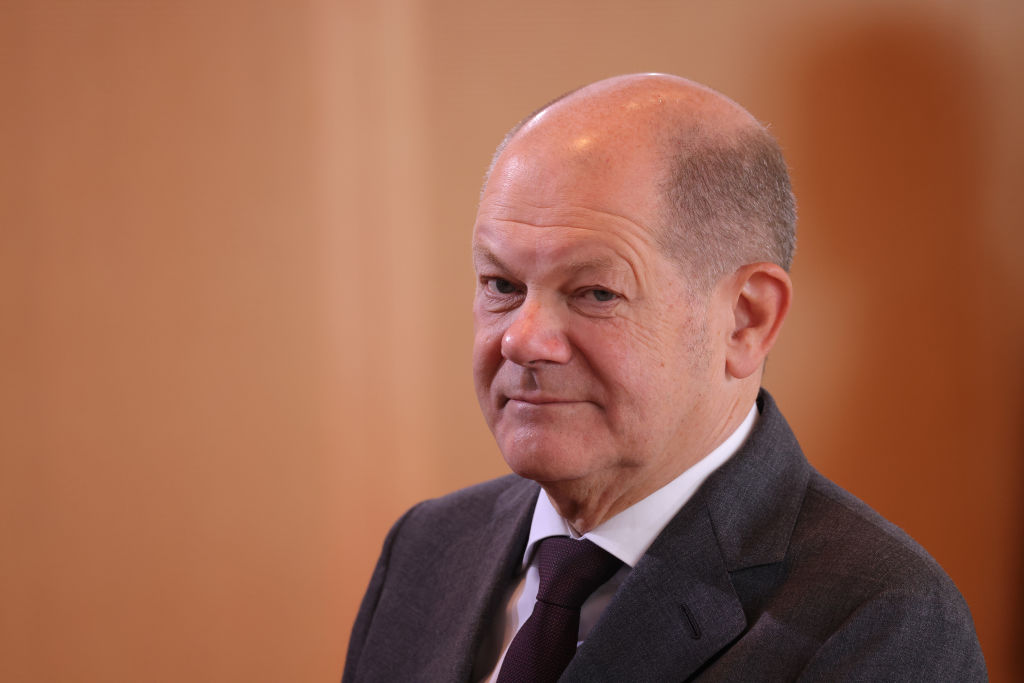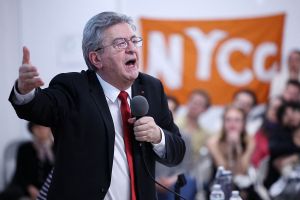German chancellor Olaf Scholz still doesn’t get it. “Der Fisch stinkt vom Kopf” (the fish stinks from its head) is a popular German saying. It’s proven right by Scholz’s abysmal failure to lead since the Russian invasion of Ukraine. He’s failing again with Israel, declaring the Jewish state is Germany’s “Staatsräson,” or raison d’êtat, but never spelling out what this means.
Scholz has flopped with his tepid attempts to explain what’s at stake for Germany and Europe in Ukraine and Israel and why Berlin should be the leadership power of the European Union. This problem is partly due to Scholz’s nature. If you think you’re the smartest guy in the room you don’t bother with pesky stuff like explaining things. It’s also because he was elected as a continuation of Chancellor Angela Merkel. Dubbed “Mutti” (Mommy), Merkel’s domestic policy can be caricatured as a general anesthetic-cum-birthday party where subsidies and social welfare presents were handed out to all. The gifts continue under Scholz: Germany is making it brutally clear it wants butter over guns. It doesn’t have the money for both.
Scholz was elected as a continuation of chancellor Angela Merkel
After thinking he could just send a few thousand helmets to help Ukraine, Scholz was shamed into supplying arms and Germany is now the second biggest provider of aid to Kyiv after the United States. But every major weapons delivery has followed a pattern. First, the Germans say “nein”. Then they say if other countries supply similar systems, maybe we will. Finally, they deliver the armaments late and get little credit for it.
The latest act of this German kabuki involves the cruise missile Taurus. The UK and France have delivered similar Storm Shadow and Scalp missiles to Ukraine but Scholz insists Berlin won’t supply the Taurus. But there is a high likelihood of him changing his tune.
Scholz and his Greens foreign minister Annalena Baerbock are illustrious in another way. They’re playing lead roles in blocking any speeding up of both NATO and EU membership for Ukraine. It was Scholz who torpedoed giving Ukraine a specific “invitation” for NATO membership at the alliance’s July summit.
Baerbock has recently given her support to Ukraine joining the EU, but there will be no fast track process for Kyiv, according to a briefing, obtained by Politico, that was sent to EU foreign ministers ahead of a meeting this month in Berlin. For good measure, Baerbock also blocked adding NATO’s 2 percent of GDP target for defense spending to a federal budget bill. For years, Germany has failed to meet the target — and Baerbock’s move means reaching it is not binding. The upshot? Germany will never reach 2 percent. So much for Scholz’s much-praised “Zeitenwende,” or historic turning point speech, given days after Russia’s invasion of Ukraine in February 2022. The speech was mainly just that: talk.
It’s almost as if Scholz still wants to believe Europe’s post-modern myth that the EU made war impossible on the continent. His refusal to pivot means he’s aiding and abetting what former Polish foreign and defense minister, Radek Sikorski, warns is a Europe that’s “a bit player when it comes to defense and security… a toothless superpower — which is to say, not a superpower at all.”
Indeed, Scholz and Baerbock are doing their best to ensure Europe’s dependency on the US endures, oblivious to the threats posed by a possible second Trump presidency. But the blame can’t lie entirely with Germany’s chancellor: plenty of Germans share his world view.
For all too many voters, their biggest concerns are ensuring a flow of cheap energy from the tyrant in Moscow, exporting machines and cars to the dictator in China while banging their anti-American drum. From working-class stiffs in the east German rust belt to blue-bloods, I keep hearing that Germany must resume pumping Russian natural gas through the Baltic pipelines to fuel industry. It’s the same story with exporting to — and investing in — communist China; VW is leading the way by announcing another €1 billion ($1.07 billion) investment earlier this year.
Other Germans, who are not reaping the benefits of such deals, are turning against the political center ground. The government’s failure to deal with a migrant crisis is another reason why the pro-Russian/pro-China far-right Alternative für Deutschland (AfD) Party is now the second strongest political force nationwide, after the opposition Christian Democratic bloc, according to polls. Even more striking: the AfD is polling number one in four of the five eastern German states. Brace for a political earthquake next year when three eastern states hold elections.
This article was originally published on The Spectator’s UK website.


























Leave a Reply